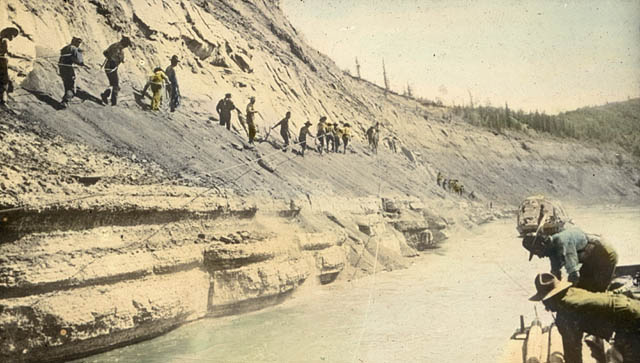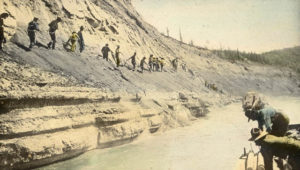Alberta mulls calls for oil production cuts

Athabasca oil sands on the banks of the river, around 1900
By Peter Kennedy

An alarming discount on Canadian crude has sparked calls for production cuts in the Alberta oil patch.
The calls from Cenovus Energy Inc. [CVE-TSX, NYSE] and others have been sparked by the difference between the price of Western Canadian Select bitumen-blend crude and New York traded West Texas Intermediate oil.
The differential between West Texas Intermediate (WTI) and the Canadian Crude Index (CCI), often referred to as Western Canadian Select, has recently hit discount levels that are at an all-time high.
Calgary-based price tracker Auspice Capital said the CCI has recently traded near US$20 per barrel, or 60% less than WTI, a discount greater than US$40 per barrel.
That compares to the average of US$18 since 2010.
As the Alberta government considers whether or not to heed the call for production cuts, it is worth looking at why the discount exists in the first place.
A key reason is the price that producers receive for a barrel of oil depends on the type of oil, where it is produced and where it is purchased.
Brent oil, for example, is priced at a premium because it has easy access to coastal ports and is inexpensive to move in large oil tankers. The name Brent refers to oil fields in the European North Sea where it originates.
West Texas Intermediate, a U.S. benchmark, trades at a price discount to Brent oil because it is produced in landlocked areas and doesn’t have the same global reach.
Western Canada Select (WCS) trades at a further discount to WTI. This is because WCS represents a stream of conventional heavy (high viscosity) oil mixed with some blends of bitumen and diluents. Also, WCS is a much heavier oil than WTI (a light oil), and is produced further away from main markets.
To some degree, industry officials say these discounts are unavoidable. They say the oil that Alberta produces is simply of a lower quality than Brent or WTI, and is located further away from customers.
However, industry officials point out that price discounts are impacted by Alberta’s access to markets. The easier it is to move oil to refineries around the world, the lower the price discounts will be.
Analysts say the discount has deepened due to growing production from the Alberta oilsands and a reduction in demand due to U.S. refinery maintenance slowdowns. Oil industry analysts and officials say the lack of available pipeline infrastructure is also a contributing factor.
Phil Skolnick, an analyst with Eight Capital Research has estimated that the recent differential between WSC and WTI oil would create an Alberta royalty shortfall of about $4 billion, if it lasted for a year.
However, it isn’t clear yet that the Alberta government will impose production cuts. It has only said that it will consider the request along with other options.
